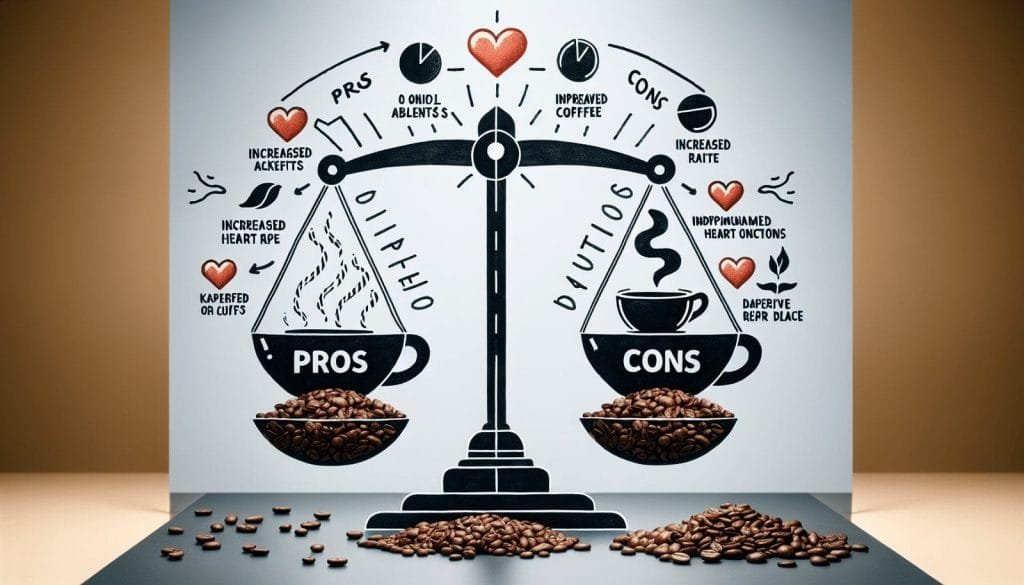Imagine starting your day with a steaming cup of freshly brewed coffee, the aroma enveloping you as you take that first sip. Coffee has become an essential part of many people’s daily routine, providing them with the much-needed kickstart to conquer the day ahead. But amidst the jumble of contradictory claims and scientific findings, you may find yourself wondering, is one cup of coffee per day good for you? In this article, we will explore the various health benefits and potential drawbacks of indulging in that single cup, uncovering the fascinating realities behind this beloved beverage.
Brief Overview of Coffee Consumption
Insight into global coffee consumption rates
Coffee is one of the most consumed beverages worldwide, captivating the taste buds of people from various cultures and backgrounds. It is estimated that over 2.25 billion cups of coffee are consumed every day, making it the second most traded commodity after oil. The popularity of coffee is evident in the staggering statistics, which reflect the deep-rooted connection between individuals and this aromatic beverage.
The role of coffee in various cultures
Coffee has transcended its status as a mere drink and become an integral part of many cultures around the world. It holds diverse meanings, serving as a social lubricant, a symbol of hospitality, and a source of warmth and comfort. In countries like Italy and Turkey, coffee has long been a cornerstone of community, with coffeehouses playing a significant role in intellectual conversations and exchanges. In Scandinavian countries, the concept of “fika” emphasizes the importance of taking a break and enjoying a cup of coffee with loved ones. Each culture’s unique relationship with coffee contributes to the rich tapestry of global coffee consumption.
Common perceptions of coffee’s health impact
Throughout history, coffee has been subject to a myriad of perceptions regarding its impact on health. While some view coffee as a vice or addictive substance, others see it as a source of energy and a catalyst for productivity. Various studies have examined the potential health benefits and drawbacks of coffee consumption, leading to a nuanced understanding of its effects on the human body. In the following sections, we will delve deeper into the components of coffee, its potential benefits and drawbacks, as well as the factors that influence its impact on individuals.
Understanding the Components of Coffee
Breakdown of the key ingredients in coffee
Coffee is a complex beverage consisting of a blend of chemical compounds that contribute to its distinct flavor and aroma. The key components of coffee include caffeine, antioxidants, chlorogenic acids, and trigonelline. Caffeine, the most well-known component, stimulates the central nervous system and provides the characteristic energy boost. Antioxidants, such as polyphenols, contribute to the potential health benefits of coffee, while chlorogenic acids possess anti-inflammatory properties. Trigonelline, on the other hand, contributes to the unique aroma and flavor of coffee.
The role of caffeine in coffee’s effects
Caffeine is undoubtedly the star of the show when it comes to coffee. It acts as a stimulant, blocking adenosine receptors in the brain and increasing alertness and focus. Caffeine also has the ability to enhance athletic performance and relieve headaches. However, it is important to note that individuals may vary in their sensitivity to caffeine, which can influence their response to coffee consumption. It is the interplay between caffeine and the other components of coffee that contributes to the overall effects experienced by individuals.
How different coffee brewing methods affect its properties
The way coffee is brewed can significantly impact its taste, aroma, and even its chemical composition. Different brewing methods, such as drip brewing, espresso, or French press, result in variations in the extraction of coffee compounds. Factors such as grind size, water temperature, and brewing time can influence the flavor profile and caffeine content of the final cup. Exploring different brewing methods allows coffee enthusiasts to discover unique nuances and tailor their coffee-drinking experience to their personal preferences.

Benefits of Drinking One Cup of Coffee a Day
Improvement of cognitive performance
For many, coffee serves as a beloved morning ritual, providing not only a flavorful start to the day but also a mental boost. Research has shown that moderate coffee consumption, equivalent to one cup a day, can enhance cognitive function, including memory, attention, and reaction time. The presence of caffeine in coffee stimulates the release of neurotransmitters, such as dopamine and norepinephrine, which are responsible for improved mood and cognitive performance. Drinking a cup of coffee in the morning can be a creative catalyst, setting the stage for a productive day ahead.
Potential weight loss aid
The quest for weight loss often leads individuals to explore different strategies, and coffee has emerged as a potential ally in this journey. Coffee contains compounds that can boost metabolism and increase fat oxidation, making it an attractive addition to weight loss routines. Additionally, caffeine has been found to suppress appetite and increase satiety, leading to reduced calorie intake. However, it is important to note that while coffee may aid in weight loss efforts, it should be consumed in moderation and complemented by a balanced diet and regular exercise.
Potential protection against certain diseases
The health benefits of coffee extend beyond the realm of cognition and weight loss. Numerous studies have suggested a potential protective effect of coffee against various diseases. Regular coffee consumption has been associated with a lower risk of developing conditions such as type 2 diabetes, Parkinson’s disease, liver disease, and certain types of cancer. The antioxidant properties of coffee, along with its ability to modulate inflammation, may contribute to these observed benefits. While further research is needed to fully elucidate the mechanisms involved, these findings provide a glimmer of hope for coffee lovers.
Potential Drawbacks of Daily Coffee Intake
The risk of increased blood pressure
One potential drawback of daily coffee intake is its impact on blood pressure. Coffee contains caffeine, a stimulant that can temporarily raise blood pressure levels. For individuals with hypertension or a predisposition to high blood pressure, the effects of caffeine on blood pressure may be more pronounced. It is important to monitor one’s blood pressure and consult with a healthcare professional to determine the appropriate level of coffee consumption based on individual circumstances.
Potential for increased anxiety
While coffee is often associated with increased alertness and energy, it can also lead to feelings of anxiety and restlessness in certain individuals. Caffeine stimulates the release of stress hormones, such as cortisol, which can contribute to increased anxiety levels. Those prone to anxiety disorders or who are particularly sensitive to caffeine may experience heightened symptoms after coffee consumption. It is essential to recognize personal limits and adjust coffee intake accordingly to maintain emotional well-being.
The risk of digestive issues
Coffee has been known to stimulate the digestive system, which can have both positive and negative effects. While some individuals may experience improved bowel movements and relief from constipation, others may be more susceptible to the potential drawbacks of increased gastric acid production. Coffee can irritate the lining of the stomach and intestines, leading to symptoms such as heartburn, acid reflux, or stomach upset. It is crucial to listen to your body and adjust coffee consumption to avoid gastrointestinal discomfort.

Caffeine Sensitivity and Individual Variations
Understanding caffeine sensitivity
Caffeine sensitivity refers to the varying responses individuals have to the same amount of caffeine. Some people can consume large amounts of coffee without experiencing adverse effects, while others may be more susceptible to its stimulating properties, even with small doses. Factors such as age, gender, overall health, and genetic predisposition can influence an individual’s caffeine sensitivity. Being aware of one’s personal sensitivity can help in modulating coffee consumption to strike a balance between enjoyment and well-being.
The effects of genetic predisposition to caffeine
Genetics play a role in how individuals metabolize caffeine, impacting both their response to its effects and the potential health risks associated with excessive intake. Variations in genes encoding cytochrome P450 enzymes, which are involved in caffeine metabolism, can influence the rate at which caffeine is broken down in the body. Some individuals may be fast metabolizers, clearing caffeine from their system quickly, while others may be slow metabolizers, leading to a prolonged exposure to caffeine and its effects.
How age and health status can influence the effects of caffeine
Age and health status also play significant roles in determining the effects of caffeine consumption. As individuals age, their metabolism and tolerance to caffeine may change. Older adults may be more sensitive to the effects of caffeine and require lower doses to achieve the same level of stimulation. Additionally, certain health conditions, such as cardiovascular disorders or sleep disorders, can interact with caffeine and exacerbate its potential drawbacks. It is important to consider these factors when determining the appropriate level of coffee consumption for optimal well-being.
Coffee Consumption and Sleep
The potential for coffee to disrupt sleep
Coffee’s ability to keep individuals awake and alert is a well-known attribute, and this can have implications for sleep quality. The stimulating effects of caffeine can delay the onset of sleep and reduce the overall duration of sleep. It is recommended to avoid consuming coffee in the late afternoon or evening to minimize the risk of sleep disruption. For those who are particularly sensitive to caffeine, even the consumption of coffee in the morning may affect sleep patterns. Being mindful of the timing of coffee intake is crucial for ensuring a restful night’s sleep.
How the timing of coffee intake affects sleep
Timing is everything when it comes to coffee consumption and sleep. The effects of caffeine typically peak within an hour of consumption and can persist for several hours afterward. To minimize the impact on sleep, it is advisable to limit coffee consumption to the earlier part of the day, with the last cup being consumed at least six hours before bedtime. This allows ample time for the body to metabolize and eliminate caffeine, decreasing the likelihood of sleep disturbances. Understanding individual sleep patterns and making adjustments accordingly can lead to a harmonious coexistence between coffee enjoyment and quality sleep.
Tips for balancing coffee consumption and sleep quality
For those who value their daily cup of coffee but prioritize restful sleep, there are strategies to strike a balance between the two. First and foremost, being mindful of caffeine intake and avoiding excessive consumption is key. Experimenting with decaffeinated coffee or alternative beverages later in the day can satisfy the desire for a warm beverage without the sleep-disrupting effects of caffeine. Incorporating relaxation practices, such as meditation or winding down routines, can also help in preparing the mind and body for quality sleep. Remember, quality sleep and a satisfying cup of coffee need not be mutually exclusive endeavors.
Consideration of Dietary Factors
How coffee fits into a balanced diet
Coffee is a calorie-free beverage when consumed without any additives, such as sugar or cream. This makes it a versatile addition to a balanced diet, offering flavor and enjoyment without adding excessive calories. However, it is essential to be mindful of the choices made when enhancing the taste of coffee. Opting for natural sweeteners or limiting the amount of added sugars can help maintain the nutritional integrity of the beverage. Coffee can be savored alongside a variety of nutrient-rich foods as part of a holistic approach to a healthy lifestyle.
Exploring the caloric impact of popular coffee additions
While coffee itself may be low in calories, the same cannot be said for many popular additions. Creamers, flavored syrups, and whipped cream can quickly transform a calorie-free cup of coffee into a decadent treat. While indulging occasionally is perfectly acceptable, frequent consumption of calorie-rich coffee creations can contribute to excess calorie intake and potentially hinder weight loss efforts. Being mindful of portion sizes and opting for healthier alternatives can help strike a balance between flavor and nutritional value.
Potential impact of coffee on nutrient absorption
Coffee has been the subject of debates on its potential to interfere with nutrient absorption. Some studies suggest that the polyphenols and tannins present in coffee can hinder the absorption of certain minerals, such as iron and calcium. However, the extent of this impact varies among individuals, and the effect can be minimized by consuming coffee at a separate time from meals or including a diversified diet. Additionally, the potential health benefits of coffee, such as its antioxidant properties, may outweigh its impact on nutrient absorption. It is essential to consider the overall dietary context when evaluating the role of coffee in nutrient intake.
Preserving Dental Health While Drinking Coffee
The potential of coffee to stain teeth
One aesthetic concern associated with regular coffee consumption is its potential to stain teeth. The dark pigments present in coffee can adhere to the enamel, leading to discoloration over time. However, it is important to note that proper oral hygiene practices, such as regular brushing, flossing, and dental cleanings, can help mitigate the effects of coffee staining. Incorporating whitening toothpaste or seeking professional treatments can further aid in maintaining a vibrant smile while indulging in one’s daily cup of coffee.
How to mitigate the effects of coffee on dental health
Besides staining, coffee can also have implications for overall dental health. The acidity of coffee can erode tooth enamel, leaving teeth susceptible to decay and sensitivity. To minimize these effects, it is advisable to limit direct contact of coffee with teeth by using a straw to consume or rinsing the mouth with water afterward. Maintaining good oral hygiene practices and regularly visiting the dentist for cleanings and check-ups are paramount to preserving dental health while still enjoying the pleasures of coffee.
Comparing the long-term dental impact of coffee vs. other beverages
When comparing the dental impact of coffee to other popular beverages, such as tea or carbonated drinks, the staining potential of coffee becomes more evident. Tea, especially green tea, contains compounds that can counteract the staining effects of coffee, making it a potentially better alternative for those concerned about dental aesthetics. Carbonated drinks, on the other hand, can contribute to tooth decay due to their high sugar content and acidity. Understanding the relative risks and benefits of different beverages can inform conscious choices and support a well-rounded approach to dental health.
Studying Long-Term Effects of Daily Coffee Consumption
Overview of long-term research studies on coffee consumption
Numerous long-term research studies have investigated the effects of daily coffee consumption on various aspects of health. These studies have examined associations between coffee and conditions such as cardiovascular disease, diabetes, neurodegenerative disorders, and cancer. While many observational studies suggest potential benefits, it is important to acknowledge the limitations of such research designs. Long-term randomized controlled trials are necessary to establish causal relationships and identify the mechanisms underlying the observed effects.
Potential benefits of long-term moderate coffee drinking
Long-term moderate coffee consumption has been associated with a range of potential benefits. Some studies suggest a lower risk of developing type 2 diabetes, possibly due to the protective effects of coffee components on insulin sensitivity and glucose metabolism. Coffee has also shown promising effects in reducing the risk of neurodegenerative diseases, such as Parkinson’s disease and Alzheimer’s disease. Furthermore, coffee’s antioxidant properties may contribute to the prevention of certain cancers, including liver and colorectal cancers. These findings highlight the potential long-term benefits of incorporating coffee into a balanced lifestyle.
Potential risks associated with long-term coffee consumption
While coffee has shown promise in various health domains, it is necessary to consider the potential risks associated with long-term consumption. Excessive coffee intake, typically exceeding four to five cups per day, has been linked to an increased risk of adverse health outcomes. These may include cardiovascular complications, gastrointestinal disturbances, and sleep disturbances. It is crucial to strike a balance and avoid excessive consumption to maximize the potential benefits while minimizing the potential risks.
Conclusion: Is One Cup of Coffee a Day Good?
Balancing potential benefits and drawbacks
The question of whether one cup of coffee per day is good must be analyzed within the context of an individual’s overall lifestyle and health goals. Coffee, when consumed in moderation, can offer numerous potential benefits, such as improved cognitive performance, potential weight loss aid, and protection against certain diseases. However, it is essential to be mindful of the potential drawbacks, including increased blood pressure, anxiety, and digestive issues. Balancing the potential benefits and drawbacks requires self-awareness and an understanding of personal limits.
Personal factors to consider
When evaluating the impact of coffee consumption, personal factors come into play. Caffeine sensitivity, genetic predisposition to caffeine metabolism, age, and overall health status can influence an individual’s response to coffee. Considering these factors allows for a more tailored approach to coffee consumption, ensuring that it enhances one’s well-being rather than detracts from it. Understanding one’s own body and actively monitoring the effects of coffee consumption are important steps in the decision-making process.
Potential need for further research
While the existing body of research provides valuable insights into the effects of coffee consumption, there is still much to learn. Further research, such as long-term randomized controlled trials, can help establish causal relationships and better understand the mechanisms underlying the observed effects. Additionally, studies that explore the interaction between coffee consumption and individual genetic variations can shed light on personalized coffee recommendations. The ever-evolving field of coffee research holds promise for uncovering new perspectives and refining our understanding of this beloved beverage.
In conclusion, one cup of coffee per day can be a part of a healthy and enjoyable lifestyle for many individuals. The key lies in moderation, being mindful of personal factors, and making informed choices. Coffee has the potential to enhance cognitive performance, aid in weight loss endeavors, and offer protection against certain diseases when consumed in moderate amounts. However, it is vital to listen to one’s body, strike a balance between enjoyment and potential drawbacks, and be open to further advancements in coffee research. Cheers to savoring that daily cup of coffee while journeying towards optimal well-being!




